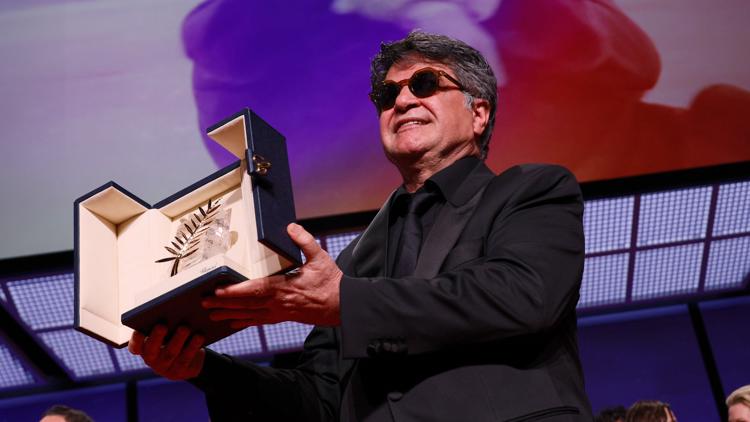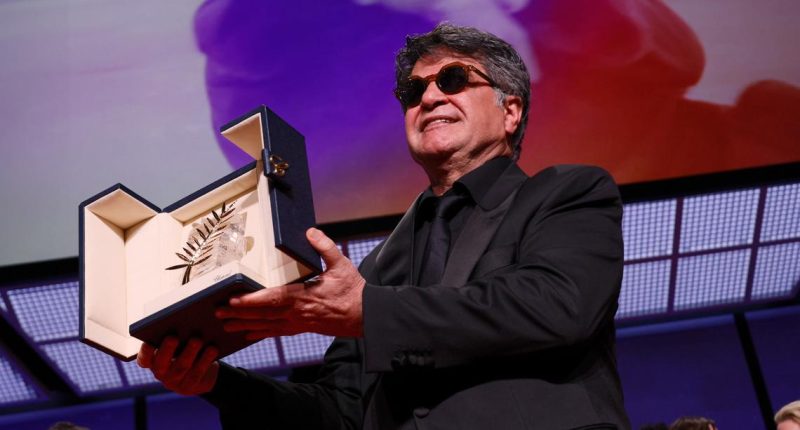Share this @internewscast.com

he closing ceremony got underway Saturday after a major power outage struck southeastern France due to what police suspected as arson.
WASHINGTON — Iranian dissident filmmaker Jafar Panahi took home the Palme d’Or at the Cannes Film Festival on Saturday for his film “It Was Just an Accident,″ a gripping revenge thriller. This significant win comes after more than 15 years of being unable to leave Iran due to a travel ban imposed on him.
Cate Blanchett awarded the prestigious prize to Panahi, who faced imprisonment in Iran three years ago, leading him to embark on a hunger strike. Despite these challenges, Panahi has persistently created films under the radar in Iran, including notable works like “This Is Not a Film,” shot in his own living room, and “Taxi,” which takes place entirely within a car.
The audience honored him with a powerful standing ovation as he triumphantly raised his arms and fell back in his seat in sheer amazement, then joined in applauding his team and the supportive crowd. Onstage, Panahi received enthusiastic cheers from Cannes jury president Juliette Binoche, who had previously shown her support for Panahi during his house arrest by holding up his name at the 2010 festival.
On stage, Panahi said what mattered most was freedom in his country.
“Let us join forces,” said Panahi. “No one should dare tell us what kind of clothes we should wear, what we should do or what we should not do. The cinema is a society. Nobody is entitled to tell what we should or refrain from doing.”
“Let’s continue to hope,” he concluded.
The win for “It Was Just an Accident” extend one of the most unprecedented streaks in movies: The indie distributor Neon has backed the last six Palme d’or winners. Neon, which acquired “It Was Just an Accident” for North American distribution after its premiere in Cannes, follows its Palmes for “Parasite,” “Titane,” “Triangle of Sadness,” “Anatomy of a Fall” and “Anora.”
All those films were Oscar contenders and two, “Parasite” and “Anora,” won best picture.
Last year, filmmaker Mohammad Rasoulof fled Iran to attend the premiere of his film in Cannes, and resettle in Germany. Panahi, though, has said life in exile isn’t for him. He planned to fly home to Tehran on Sunday.
“It Was Just an Accident” was inspired by Panahi’s experience in jail. In it, a group of former prisoners encounter the man who terrorized them in jail, and weigh whether or not to kill him.
“The film springs from a feeling of resistance, survival, which is absolutely necessary today,” Binoche told reporters after the ceremony. “Art will always win. What is human will always win.”
The Cannes closing ceremony followed a major power outage that struck southeastern France on Saturday in what police suspected was arson. Only a few hours before stars began streaming down the red carpet, power was restored in Cannes.
Other winners at the 2025 Cannes Film Festival
The Grand Prix, or second prize, was awarded to Joachim Trier’s Norwegian family drama “Sentimental Value,” his lauded follow-up to “The Worst Person in the World.” Some had expected “Sentimental Value” to win the Palme, but Trier — whose film reunites him with actor Renate Reinsve — still took a major prize.
“We live in a time of tremendous excess and saturation of images. Moving images are being thrown at us all the time,” said Trier. “And I want to give homage to the Cannes Film Festival for being a place where the big cinematic image, which is the foundation of the moving image, the free image, the image that we take time to look at, the image where we can identify with each other in contemplation and empathy, to be cherished in this place in such a way is very important in this moment.”
Kleber Mendonça Filho’s Brazilian political thriller “The Secret Agent” won two big awards: best director for Filho and best actor for Wagner Moura. Though Cannes juries are generally urged to spread awards around, the two for “The Secret Agent” showed the jury’s strong feelings for it. Asked about the two prizes, juror Jeremy Strong explained, simply, “That was our wish.”
The wins, which followed the international film Oscar victory for Walter Salles’ “I’m Still Here” in March, gave Brazil more to celebrate. On X, Brazilian President Luiz Inácio Lula da Silva, said the awards “show that our country’s cinema is second to none.”
The jury prize was split between two films: Óliver Laxe’s desert road trip “Sirât ” and Mascha Schilinski’s German, generation-spanning drama “Sound of Falling.” Best actress went to Nadia Melliti for “The Little Sister,” Hafsia Herzi’s French coming-of-age drama.
The Belgian brothers Jean-Luc and Pierre Dardennes, who are two-time Palme d’Or winners, won best screenplay for their latest drama, “Young Mothers.” Cannes’ award for best first film went to Hasan Hadi, for “The President’s Cake,” making it the first Iraqi film to win an award at the festival.
What else shaped Cannes this year
Saturday’s ceremony brings to a close a 78th Cannes Film Festival where geopolitics cast a long shadow, both on screen and off. Shortly before the French Riviera extravaganza, which is also the world’s largest movie market, U.S. President Donald Trump floated the idea of a 100% tariff on movies made overseas.
Most filmmakers responded with a shrug, calling the plan illogical. “Can you hold up the movie in customs? It doesn’t ship that way,” said Wes Anderson, who premiered his latest, “The Phoenician Scheme” at the festival.
That was one of the top American films in Cannes, along with Spike Lee’s “Highest 2 Lowest,” the Christopher McQuarrie-Tom Cruise actioner “Mission: Impossible — Final Reckoning” and Ari Aster’s “Eddington.”
Copyright 2025 Associated Press. All rights reserved. This material may not be published, broadcast, rewritten, or redistributed.
















